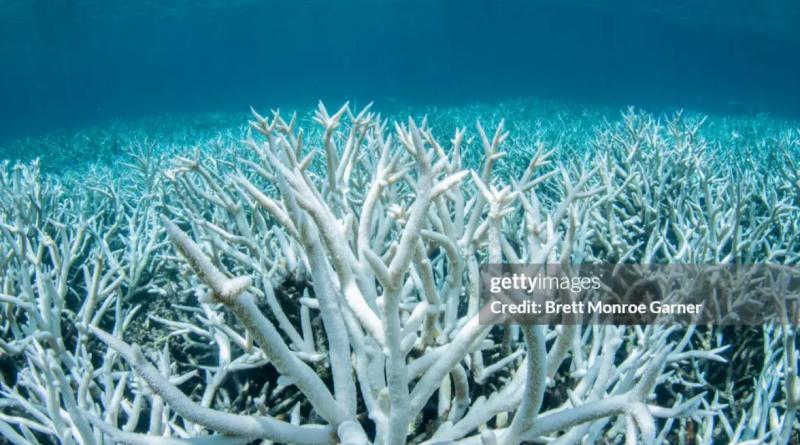Global heating pushes coral reefs towards worst planet-wide mass bleaching on record

Global heating has pushed the world’s coral reefs to a fourth planet-wide mass bleaching event that is on track to be the most extensive on record, US government scientists have confirmed.
Some 54% of ocean waters containing coral reefs have experienced heat stress high enough to cause bleaching, the National Oceanic and Atmospheric Administration’s Coral Reef Watch said.
A global bleaching event is declared when at least 12% of corals in each of the main ocean basins – Pacific, Atlantic and Indian – experience bleaching-level heat stress within a 12-month period. The declaration also requires confirmed reports of bleaching.
Coral Reef Watch also confirmed the world’s largest coral reef system – Australia’s Great Barrier Reef – had been through its most widespread heat stress event on record in 2024.
The first global bleaching event happened in 1998 with 20% of the ocean’s reef corals exposed to a level of heat stress high enough to cause bleaching. The second event, in 2010, saw 35% reaching that threshold, and the third from 2014 to 2017 peaked at 56%.
Dr Derek Manzello, the Coral Reef Watch director, told the Guardian the current bleaching was likely to surpass the previous most widespread event soon “because the percentage of reef areas experiencing bleaching-level heat stress has been increasing by roughly 1% per week”.
NOAA’s threshold for the onset of bleaching relates to the amount of accumulated heat corals are facing at any given time, known as degree heating weeks (DHWs).
For example, a 1 DHW is accumulated if corals are subjected to temperatures 1C above the usual maximum for seven days. Coral Reef Watch considers 4 DHWs as a bleaching threshold.
Coral reefs are rich in biodiversity and provide habitat to a quarter of all marine species while covering less than 1% of ocean area. Reefs provide food and tourism income to millions of people and protect coastlines, but are considered to be one of the most vulnerable ecosystems to global heating.
The current global event started in early 2023 and in the northern hemisphere summer reefs across the Americas bleached from record levels of heat stress.
Mass bleaching has been confirmed throughout the tropics, NOAA said, including Florida, the Caribbean, Brazil, many countries across the south Pacific, the Middle East and in parts of the Indian Ocean from Indonesia’s west coast to reefs off east Africa.
Prolonged and severe bleaching can kill corals, but if temperatures fall quickly enough the animals can recover. Research has found previously bleached corals find it harder to reproduce and can be more susceptible to disease after bleaching.
Manzello said global heating had combined with a global El Niño to push up sea surface temperatures. He said predictions made by scientists decades ago about the fate of corals in a warming world were now coming to pass.
“The bottom line is that as coral reefs experience more frequent and severe bleaching events, the time they have to recover is becoming shorter and shorter. Current climate models suggest that every reef on planet Earth will experience severe, annual bleaching sometime between 2040 and 2050.”
Prof Ove Hoegh-Guldberg, a pioneer of coral research who was among the first to link bleaching to global heating, said: “It’s a shock. We clearly have to prevent governments from investing in fossil fuels, or we won’t have a chance in hell [to save reefs].”
Earlier this year, Coral Reef Watch was forced to add three new alert levels to its global coral bleaching warning system to represent ever-increasing extremes.
Prof Tracy Ainsworth, the vice-president of the International Coral Reef Society, said the bleaching had extended to some of the most remote places on earth.
“Globally we are failing to protect coral reefs and the communities that rely upon them. This is neglect on a global scale,” Ainsworth said.
The Great Barrier Reef is now suffering its fifth mass bleaching in eight years. Coral Reef Watch data shows 80% of the reef was subjected to bleaching-level heat stress in 2024, the highest extent on record and above the previous high of 60% seen in 2017.
Dr Roger Beeden, the chief scientist at the Australian government’s Great Barrier Reef Marine Park Authority, said it was more important than ever to see global action on climate change.
“But the prognosis is not good for coral reefs as we know them, and the GBR is not immune. We are certainly not giving up on reefs, but they’re under serious pressure.”





